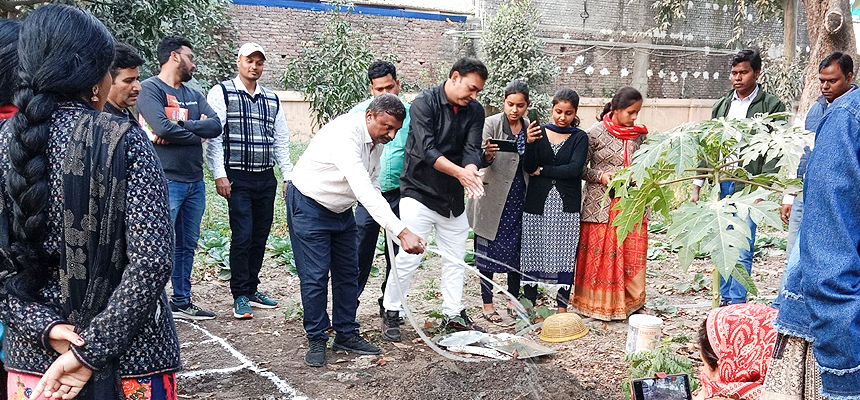Caritas at a National Platform for Disaster Risk Reduction (NPDRR) 2023 meeting presented the Community Based Flood Early Warning System claim to mitigate the loss of life and property during floods. The pre-event of the 3rd Session of NPDRR 2023 was organised by Assam State Disaster Management Authority (ASDMA) in association with the National Disaster Management Authority (NDMA) and National Institute of Disaster Management (NIDM) at Assam Administrative Staff College, Khanapara on 18-19 February 2023.
Author: GlobalIndia (GlobalIndia )

Rise of disaster resilience through a participatory approach
The people of Makarampur are anxious during the monsoon. The only road joining them with the other villages suffered heavy damage due to rain and flood. This muddy road was the important link between the three adjoining villages and the only means to commute to Pirpaiti Block of Bhagalpur. Floods are a yearly occurrence in the Bhagalpur District of Bihar. Every year, floods of varied strength hit the area, claiming lives and destroying structures worth millions of rupees. The impact of this flood directly falls on the vulnerable population, disrupting their mobility, and hampering their livelihood, education, healthcare and other necessary engagements.

Particularly vulnerable households increased their disaster resilience through neighbourhood help initiatives
A woman member of Mahaveer SHG from a marginalized community affirms that she is now resilient to natural disasters through their own livelihood initiatives, neighbourhood help, and making greater use of existing government support services. Mahaveer SHG is an 11-member group belonging to a particularly vulnerable community that is engaged in dry fish production and sale in Odisha. The group sells Chinguri (dry prawn of a different variety), Savada, Saalali (dried sardine) and Pindi among others. They make a sustainable profit of INR. 2,000 and hired a storeroom for storing dry fish from their own fund.

Tackling life-threatening severe malnutrition in Bihar
Two-year-old Rajkumar is severely malnourished. He and his family, from poverty-stricken Dalyahushnabad, Purnea, Bihar, live in deprivation and struggle to get enough food. Rajkumar is one of the lucky ones. His severe malnutrition was caught and treated before developing into a life-threatening condition. Rajkumar’s 35-year-old mother, Ramni Devi, was restless about her son’s loss of appetite and weakness. She was worried but not ready to take him to the Nutrition Rehabilitation Center (NRC), as she feared that her son’s kidney would be taken out at the centre.

How diversified livelihoods can build resilience against climate impacts
We cannot prevent climate change but can surely mitigate its effects. India, especially the coastal areas, is under threat due to the increasing frequency of disasters. These disasters obstruct the normal cycle of life by destroying the lives, properties, and livelihoods of the people. The state of Odisha, in the east part of India, with over 27 km of coastline and 11 river basins, is prone to cyclonic storms and flooding. Around one-fifth of Odisha’s geographical area is flood-prone, especially 85% of its agriculture-dependent population. Flooding and overflowing rivers repeatedly inundate agricultural lands, leaving farmers stranded.






